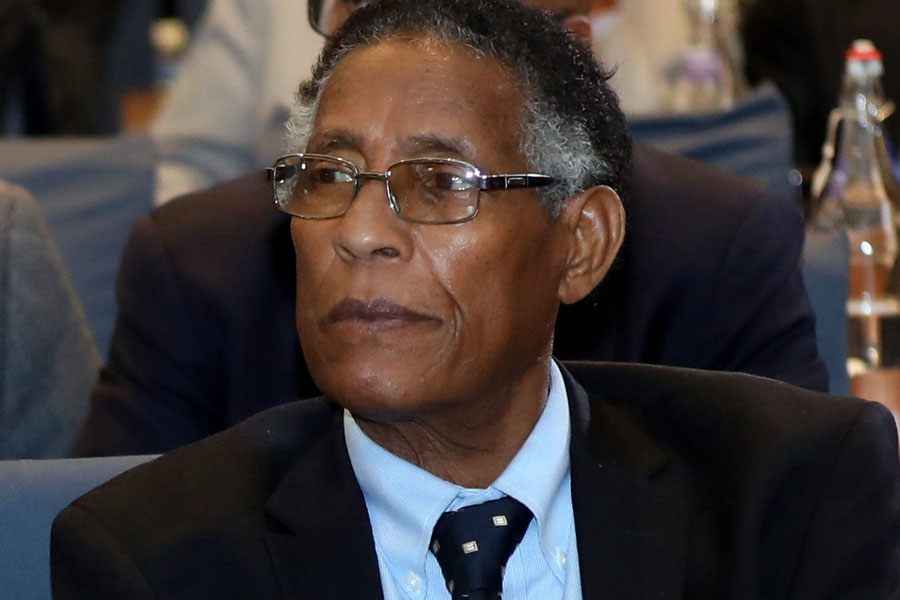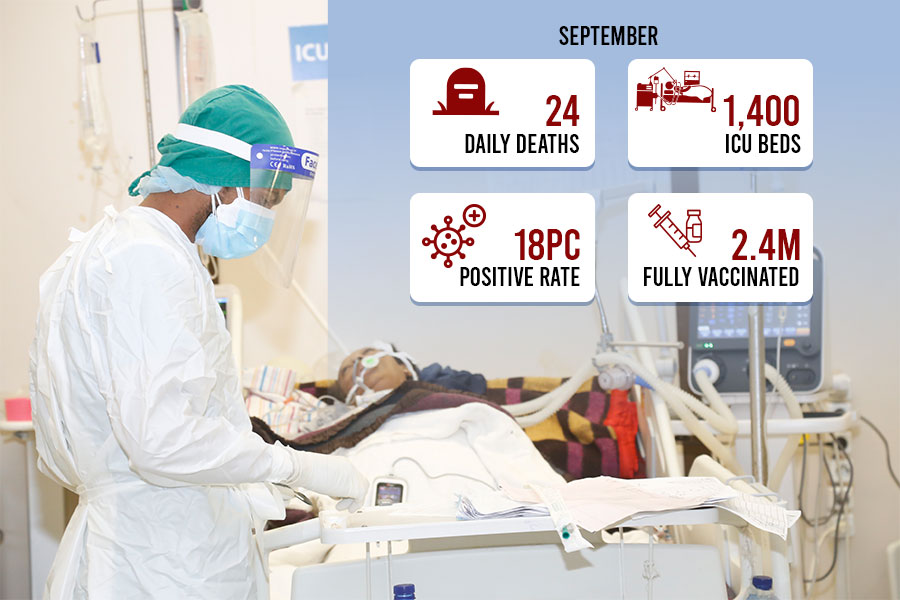
Fortune News | Sep 04,2021
The sunny city of Meqelle, the seat of Tigray Regional State, is overrun with campaigns, posters and advertisements. Large boards tower over the city about to hold its election in less than a week's time.
The banners and the billboard display different party logos: two hands firmly clasped together, a clenched fist or a picture of the famous Axum obelisk, a UNESCO heritage site and the emblem of the incumbent party that has reigned in the region for close to three decades.
Any meditation on the signs and the symbols and what they may mean, however, is soon interrupted by the cars blasting upbeat music or announcements blasting from megaphones urging people to vote for their party.
The common coffee cafes in the city centres are alive with discussions of everyone's favourite party, and whatever buzz that may have disappeared from the city due to the Novel Coronavirus (COVID-19) seems to have been brought back by the election.
The Tigray Election Commission, located adjacent to the office of the Regional State's president, was also filled with many busy people. Perhaps the busiest of them all is the Commissioner himself. With just under a week left until the region's upcoming election, his office is electric with youth zooming in and out.
Last week, he was addressing a complaint by a young man who was erroneously put down as an observer for the election. Just one of the Commissioner's many tasks.
The Commissioner and his colleagues were sworn in on July 16, 2020, and are directly accountable to the Tigray Regional State Council. Their work is supervised by a standing committee led by the Speaker of the House. The barely two-month-old office and its team seem to have grown into their roles; the schedules are fast-paced, and everyone is kept on their toes.
With Commissioner Muluwork Kidanemariam, more commonly known as Memhir Muluwork due to his days as a teacher, in the lead, the Commission is charged with executing the regional election. It has held discussions with all the political parties to determine the use of time and finance for political parties as well as airtime for campaigns.
So far, it has hosted political debates on four main topics: democratisation, self-determination and the future of Tigray; development policy; health and education; and peace and security. There are five main political parties vying for seats: Tigray People's Liberation Front (TPLF), Salsay Woyane Tigray, Tigray Independence Party, National Congress of Great Tigray (Baytona) and Assimba Democratic Party. The first four are running for 152 seats in the Council and Assimba for 13 seats across the Regional State.
But this election is unlike any held in the region before. For one, it has been deemed unconstitutional by the federal government and the National Electoral Board of Ethiopia for defying the state of emergency protocols that postponed the election. Additionally, unlike most other elections, very little time has been left for campaigning.
To others, however, the lively campaigns are what has surprised them most, according to Hailu Kebede, head of the campaign of Salsay Woyane, which was established a year and a half ago with a focus on young voters.
“Young people want to see diverse ideas and a multiparty democratic system," he said. "I believe this is what we signify.”
Salsay Woyane, with social democracy as its driving ideology, was against the set date for the election, arguing that there was not enough time for campaigns. But they have been assuaged by the fair division of airtime and financial support.
The parties are partly financed by the Commission, a total of five million Birr in cash and 10 million Br in kind. Its allocation is mainly influenced by the number of seats the parties will be running for; but a greater number of participants are women, and people with disabilities are also being taken into account. Similar factors, to different degrees, were weighed for airtime as well.
The 90 minutes of airtime a day was later bumped to 120 for television stations and 150 minutes on radio stations to accommodate the quickly upcoming polling date announced by the Commission. However, due to the pandemic, the political parties are limited to using media, pamphlets and microphones to campaign in the Regional State.
Political parties in the Region State take their turn to explain their investment policies to the members of the Tigray Chamber of Commerce.
This has restricted their reach into remote parts of the country for parties like Salsay Woyane, whose election campaign is titled "New Chapter, New Deals."
"Campaigning in the urban areas has been relatively easier," Hailu said, "but the rural parts of the state remain difficult to reach.”
In addition to this, the incumbent, TPLF, has also been accused of coercion by the party.
“Many of our candidates were pressured," said Hailu. "Their families were told that their children had turned into traitors,” he said.
Despite this, the party is hopeful and expects to gain seats in the Regional State Council, according to him.
Supporters of Salsay Woyane, which include Meseret Gebregzabihier, a 24-year-old musician living in Meqelle, are also looking forward to a change.
“TPLF has been in power for so long and hasn’t solved many of the issues in the State," said the musician, who was born and raised in Meqelle. "I think it’s time for a change, and I believe that Salsay Woyane can bring about that change.”
Meseret, who hopes to make it in the music industry, is also working on the party's anthem.
The ideology of Baytona, an opposition party, may be different, but the expectation for change is similar, according to Abraha Teklu, vice-chairperson of the party.
“We believe we've taken major strides along the path to democratisation," he said, stating that, "the coming five years won't be like the past five. We want the government to be more accountable.”
But the elections are not seen as a harbinger of positive change by all. Opposition party Ethiopian Citizens for Social Justice, aka Ezema, expects this to escalate the political atmosphere in the country.
“We believe that the decision to go ahead with the Regional State election separate from the rest of the country goes against the Constitution," said Nathanael Feleqe, head of public relations at Ezema.
The fact that elections are continuing despite COVID-19 also brings undeniable restrictions for some.
Haile Tessema, an Ethiopian-born American, moved to the Regional State some eight years ago and has been closely observing the election mood.
Political debates that take place on electronic media and primarily in urban settings deprive economically disadvantaged and rural residents of the country, according to him.
"They don't get the opportunity to hear the political agenda and public policy of the parties and candidates," he said.
He also believes the debates to be too elitist and something he doubts the average person could relate to.
"It would've been more relevant to address policies that are going to affect people’s daily lives - bread and butter issues," he said.
Short-sighted, hyper-urbanisation does not treat agricultural livelihoods, food security, and long-term environmental impacts as major issues, according to him.
Haile also believes the opposition parties are fragmented.
"It'll be a losing battle to confront a political party that has ruled the region since the Ethiopian federation was formed disjointly," he said.
Birtukan Haile, a lecturer at Meqelle University Law School, is also excited because of the revision of the electoral system, which changed the first-past-the-post election system to a mixed system that couples the former voting system with proportional representation.
“It's encouraging, because you feel like your vote matters," she said.
The performance of the opposition parties in having an equal number of candidates throughout the state and representing every single electoral district in such a short period of time is impressive, according to Dade Desta, a policy analyst.
The confidence of the parties going neck to neck with the incumbent is not lost on him. Even so, he understands winning elections requires more than fielding candidates and performing well in televised debates.
“It takes a long time, manpower and financial resources," he said. "You need to knock at every door and talk to families and professionals."
He believes there should have been more work supporting individual candidates, which have dwindled from 11 to just four since the date of registration.
But the practice itself is encouraging, according to Dade, who believes that democratisation comes with repeated democratic elections of this kind and the building of institutions as well as a civic society.
"I wouldn’t rule out the possibility of some significant presence of the opposition in the upcoming Regional State Council," he said, "though I would've liked to see Arena become part of this historic political process."
Arena Tigray for Democracy & Sovereignty, the second oldest party in the Regional State, has excluded itself from the election, mentioning concerns over constitutionality.
But the issue of constitutionality is one that has drawn divides across the field with some arguing that this is a clear indication of the commitment of the people of Tigray to their right for self-determination, according to Getachew Reda, a high ranking member of TPLF. This move sends the message that rights cannot be given nor denied by authoritarian leadership, he added.
"There is no legitimate political leadership in the federal government," Getachew said, "but the bureaucratic state will continue, as far as we're concerned.”
Getachew, who is a member of the parliament, stated that he had to make a choice.
"I can’t have it both ways,” he said. “I’m saying the extension of the powers of the federal government is unconstitutional; and if that is the case, then I can't continue to serve as a member of the parliament as of October 6.”
With the absence of the members from Tigray Regional State, the House of Federation, in its extraordinary session held on September 5, passed a motion denying the constitutionality of the electoral process of the Regional State and declaring its outcome illegitimate. Members who attended the session unanimously approved the motion that was tabled by the Constitution & Identity Standing Committee, stating that the election law and the electoral commission of the Regional State are not constitutional; thus, the outcome of the election is not valid or legitimate.
The decision of the House of Federation, however, is rebutted by the Commission.
The legitimacy of the Regional Election Commission stems from the regional constitution, State Council and people of Tigray, according to Meressa Tsehaye, a member of the regional election commission.
“The regional government has the mandate to govern itself, and it's exercising this right accordingly,” Meressa said.
Even so, the decision made by the House was nothing but a futile exercise since it did not set forth specific actions, according to Alemayehu Fentaw.
“Pinning the political crisis in Ethiopia on the rift between the TPLF and the Prosperity Party is too simplistic and reductionist,” he said. “Conflict analysis precedes conflict resolutions. We must work to understand the problem in a wholistic manner.”
The effects of the pandemic, the reason for the rift between the federal and regional government, is also up for contention.
Tigray Regional State surpassed 4,200 cases of COVID-19 last week, the region with the third-highest number of cases following Addis Abeba and Oromia Regional State.
Araya Abrha (PhD), associate professor of global health & development at the School of Public Health at Meqelle University, believes that the high number of cases does not necessarily imply that the virus is spreading more rapidly in the state and may be an indication of better contact tracing implementation.
“Considering our socioeconomic circumstance, it would be difficult to declare a lockdown," said Araya, who believes that appropriate measures were being taken to prevent the spread of the virus. "So we must instead learn to properly balance the economic and political aspects by continuing to practice measures to prevent the spread of the virus."
"The focus should be in ensuring that it doesn’t spread so fast that we are overwhelmed," he said.
Others think that while the election day itself may not play a major role in spreading the virus, election campaigns and rallies might cause the spread and that campaign season and the general atmosphere of elections may divert attention from the pandemic.
PUBLISHED ON
Sep 06,2020 [ VOL
21 , NO
1062]

Fortune News | Sep 04,2021

Obituary | May 21,2022

Fortune News | May 21,2022

Films Review | Apr 17,2020

Fortune News | Sep 18,2021

Dec 22 , 2024 . By TIZITA SHEWAFERAW
Charged with transforming colossal state-owned enterprises into modern and competitiv...

Aug 18 , 2024 . By AKSAH ITALO
Although predictable Yonas Zerihun's job in the ride-hailing service is not immune to...

Jul 28 , 2024 . By TIZITA SHEWAFERAW
Unhabitual, perhaps too many, Samuel Gebreyohannes, 38, used to occasionally enjoy a couple of beers at breakfast. However, he recently swit...

Jul 13 , 2024 . By AKSAH ITALO
Investors who rely on tractors, trucks, and field vehicles for commuting, transporting commodities, and f...

Jul 5 , 2025
Six years ago, Ethiopia was the darling of international liberal commentators. A year...

Jun 28 , 2025
Meseret Damtie, the assertive auditor general, has never been shy about naming names...

Jun 21 , 2025
A well-worn adage says, “Budget is not destiny, but it is direction.” Examining t...

Jun 14 , 2025
Yet again, the Horn of Africa is bracing for trouble. A region already frayed by wars...